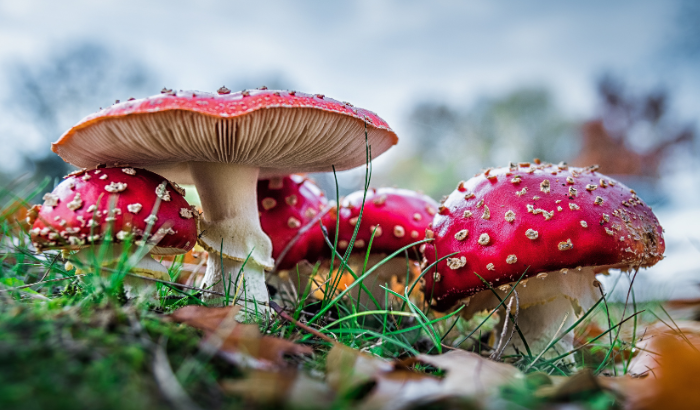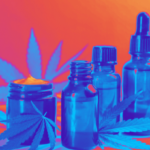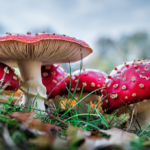
“We knew we wanted to do something in psychedelics as we believed [Amanita muscaria] could be disruptive to the existing medicinal landscape.”
Plant medicines and psychedelic substances are gaining popularity in the United States. They have been for years; one 2022 study revealed that roughly one in four Americans have experimented with psychedelics at least once—and with legalization efforts gaining steam across the country, use will likely increase exponentially in the decades ahead.
While magic mushrooms are often the first drug referenced in casual coverage of the psychedelic advocacy movement, the current legalization campaign in Massachusetts has helped illuminate some lesser-known psychedelics. The proposed referendum, which is headed for the general election ballot in November, also includes Ibogaine and Dimethyltryptamine (DMT), among other substances.
However, there are also many psychedelics that are federally legal to cultivate, consume, and even sell on the open market, online and in stores. What’s more—they might even be for sale at a CBD or plant wellness shop near you.
Amanita muscaria are a federally legal mushroom that, depending on who you ask, either is or isn’t an official psychedelic substance. Also known as fly agaric, they aren’t nearly as dangerous as their close fungi family member Amanita phalloides (aka death cap mushrooms), which have been associated with homicides as well as accidental poisonings. Amanita muscaria can pose serious health risks at high doses though, and, unlike Schedule 1-status psilocybin mushrooms, fly agaric are technically poisonous, containing toxic alkaloids.
The relatively weak hallucinogenic properties related to Amanita muscaria consumption are attributed to bufotenine, a DMT analog that hits the serotonin neurotransmitter. Still, the substance is federally legal, though it’s not FDA-approved as a food additive or as a drug to treat illness. On the state level, Louisiana is alone in outlawing Amanita muscaria. But there’s been some recent fly agaric controversy in Florida, with the state suing a Tallahassee-based CBD company over its sale of mushroom derivatives, and the Florida Department of Agriculture seizing nearly 2,000 synthetic THC and Amanita muscaria products from a Miami Beach warehouse last September.
Despite some backlash, consumer interest in this particular “legal psychedelic” continues to surge—adding an additional layer to the complex nature of legalization efforts while simultaneously illuminating a potential commercial production pipeline for the future integration of psilocybin-based products into the legal plant medicine market.
To learn more about the business structure, motives, prospects, and potential product lines, I spoke with Jeff Stevens, the CEO of Psyched Wellness, a Canadian company that sells Amanita muscaria extract tinctures. A veteran of the Canadian financial system, his move to the forefront of next-gen plant medicine has been highly unconventional. He offered his perspective on the future of psychedelics, the necessary optimism needed to lead an effective new-age company like Psyched Wellness, and more …

Describe your personal and professional background …
I am proud to say that I am happily married for 22 years, same wife, a rarity for people in the capital markets and entrepreneurs. I am the proud father of two great kids, young adults, who challenge me and keep me current.
I started my career in the Canadian capital markets in Toronto, in the early 2000s. Over the years, I worked as an assistant to a retail broker, a trader at hedge funds, running institutional sales and trading desks at boutique brokers, and eventually taking the plunge to work on the dark side, building, financing, and running public companies.
When, how, and why did you first become interested in plant medicine, Amanita muscaria mushrooms, and/or psychedelics?
I came to this from the capital markets side. Some of my trusted friends/advisors/financiers were looking to start a new company and asked me to run it. We knew we wanted to do something in psychedelics as we believed these compounds could be disruptive to the existing medicinal landscape.
After reviewing the pros and cons of many plants and mushrooms it was my COO and co-founder, David Shisel, that identified Amanita muscaria. When he initially brought the idea forward, I, like so many, said he was crazy. When you Google “Amanita” it comes up poisonous—how could a public company work with such a mushroom? To his credit, he pointed out that various indigenous groups have been using and consuming the mushrooms for 5,000 years, so we just needed to roll up our sleeves and do some work.
With so many companies focusing on psilocybin, DMT, and ketamine, the idea of working with a mushroom that no others were competing for airtime on seemed very intriguing. We then set off to build our advisory board and board to support us in this endeavor.
If you were speaking to a potential customer with no prior experience with plant medicine and/or psychedelics, how would you describe the difference between the effects of Muscimol compared to psilocybin?
We have this conversation regularly, as many people confuse Amanita for magic mushroom. We believe this is largely due to the fact that the industry uses the image of the Amanita mushroom to depict psychedelic mushrooms. The reality is, these two compounds are very different, interacting with different receptors and providing different experiences to users.
Our flagship product, Calm, is a tincture designed to promote rest and relaxation. Muscimol, the main compound in our proprietary extract, AME-1, is a Gaba A Agonist, and in low doses works very well to calm the body and brain. If taken in larger doses, it has a similar effect as alcohol, promoting an inebriated sense. Psilocybin interacts with the serotonin receptors, most often in the prefrontal cortex. This part of the brain affects mood, cognition, and perception. Hallucinogens also work in other regions of the brain that regulate arousal and panic responses. Promoting feelings of euphoria, peacefulness, and spiritual awakening.
In your opinion, how will legalizing psilocybin and other psychedelic drugs in the United States impact the market share and profitability of companies—like Psyched Wellness—that already sell legal psychedelic/plant medicine products?
We view legalizing psilocybin and other psychedelic drugs in the United States as a massive opportunity for everyone working in the sector. The reality is, the market is very large and the more legitimate it becomes from the legal perspective, the negative stigma will be removed and more people will feel comfortable accessing and trying psychedelics for their health and wellness. We are not intimidated by this, we welcome it, and look forward to being part of a larger movement with new, science-based companies bringing safe, standardized products to market for consumers.
Does Psyched Wellness have any plans to introduce a line of psilocybin-based products in the future?
As the only publicly traded company with products derived from Amanita that are legal for human consumption in the USA, we don’t see a reason to deviate from our path. We support and cheer on our peers working with psilocybin, but feel we have a large enough market to tackle with AME-1.
We view ourselves as the pioneers of the Amanita Muscaria mushroom in the commercial landscape. We spent two years and millions of dollars on preclinical studies, including, toxicology studies, behavioral studies, shelf-life stability studies, alcohol interaction studies, to name a few. We have studied this mushroom more than any other group and feel that we have a distinct advantage continuing on our path with our extract. We strongly believe we have just scratched the surface of what our full spectrum extract is capable of and we look forward to introducing many more product SKUs to our consumers.
As psychedelic medicine continues to gain traction around the world, what do you see as the best-case and worst-case scenarios for its future in both Canada and the United States?
I think the best-case scenario is to see common-sense legislation continue, for legalization and standardization of these compounds to be mandated so consumers have safe, secure, and educated options for their health and wellness needs. In order for this to happen, we need to see continued investment into the sector, capital for more clinical trials, and lawmakers that are open to supporting plant medicine over big pharma when it makes sense.
I think the worst-case scenario would be for the positive momentum that we are seeing in both countries to end. The reality is we are largely in a period of decriminalization, where many bad actors like to play, and my fear is that some unfortunate event could occur where someone using substandard products (non-GMP manufactured) could have a bad experience that could sway public opinion and legislators to back track.
You can follow all the ins and outs of psychedelics in the Bay State and beyond in Jack’s Psychedelic State(s) of America newsletter covering the people, policies, and science driving the ongoing psychedelic science revolution.

























